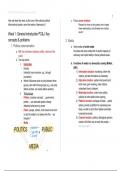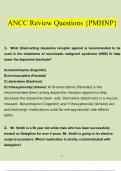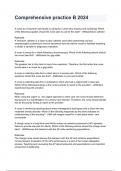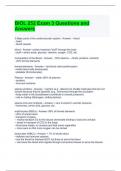Political Communication and Journalism
1
How well does the news, as the core of the national political c. Focus: power relations
informational system, serve the needs of democracy? Research is driven by the question who ‘shapes’
these relationships, and ultimately who controls
whom?
Week 1: General introduction PC&J, Key
concepts & problems 2. Media
1. Political communication a. (free) media as fourth estate:
a. Def: the interactions between politics, media and the the press and news media both in explicit capacity of
public advocacy and implicit ability to frame political issues
b. Two key points:
i. Interaction b. Functions of media in a democratic society (McNair,
- Directly 2003)
- Indirectly (more common, e.g., through 1) Information function: monitoring, inform the
journalism) citizens, provide information as necessary
● effects/ influences exist not only between three 2) Education function: explain what events and
groups, also within three groups (e.g., one party facts mean, give meaning, make citizens
affects another, one media affects another) understand how to interpret
ii. Three groups 3) Watchdog function: control over politics,
- Politics: (complex concept) … government, publicity for what politics does (wrong)
parties → can persuade people change 4) Platform function: exchange of ideas → public
attitudes/ behaviours by power sphere, provide a platform for expressing own
- Public: people, citizens, truth should come from ideas, we talk to each other/ debate (vertically/
us but the reality is not always like this → our horizontal involved)
freedom? 5) Channel function: political, ideological opinions
- Media needs to find their way to reach the people (a
little downward?)
, Political Communication and Journalism
2
c. Threats to performing five functions?
threats explanations Functions that are solutions
threatened
1) The audience not ● Videomalaise (Robinson, 1975) 245 ● Rebuild trust in media
being able/ willing to ○ Watching information on television has negative effects on the public Education ● Avoid filter bubbles and
process the information → E.g., cynicis, low trust in political institutions, low sense of political efficacy (the Platform echo chamber
provided, or distinguish feeling tha you understand politics and also do something yourself) channel ● Political satire
● Regulations for social
news from misinformation media
● Dumbing down
○ People cannot (and don’t want to) process political information (anymore)
● Later: criticism to mediamalaise theory
○ Positive effects of media content are possible
○ Some, rather sensational elements can be good to some extent, to reach more
people
○ Journalists should focus on the audience as citizens, and can try to address them
all
2) Journalists getting Ref. Bennett: Indexing → (think someone/ something is important, do as “the safe way” everyday) 1 +3 ● Different approach to
stuck into safe routies, ● Journalists focus on elite opinions. Information journalism
instead of providing the ○ If elites agree, no other opinions are presented Watchdog E.g., journalists with an
information the public ○ Reasons: routies, easiness, safety/ risk-avoidance adversarial role conception
2 + 4 → since some
needs information and
interpretations will not
make it into news
education
Platform
3) Decreased news ● = shift from the normative to commercial pole (journalistic perspective) (Karidi, 1234
media quality due to 2018) Information
commercialisation ● = commercialization → maximizing the audience, maximum profit Education → less, cost
=> sensational news money
Watchdog → expensive,
=> quality (lower) Normative news —(add sensational elements)—> commercial news/ sensational news: so less
=> quantity (partly ● Sensational news will: Platform → under
missing) ○ → Lead to the inclusion of sensational elements in the news (topics, format, pressure due to
vividness) decreased pluralism (see
=> Medatization (check ○ → elements of entertainment will enter the news text Plessing)
below)
, Political Communication and Journalism
3
Channel function has no
problem = cheap
● Lower quality, how does it work?
News = commodity. People can get it for free, so they get it for free (online). →
Business models of traditional journalism fail
○ Consequence: budget cuts, decreasing investments in quality journalism,
media concentration, market logic takes over, increased competition for
attention of the audience and advertisement revenues
○ → sensationalism and lower news quality.
● And quantity? Information abundance?
○ The information abundance we experience e.g. via internet and social media =
partly misleading
4) Political actors ● Lack of independence of media 12345 ● More state intervention?
(re)gain control over ● Lack of internal and external pluralism Information ○ Ensuring press
media content (lack of ○ Internal: same news outlet, have different voices Education independence, Media
pluralism and ○ External: media systems/ different outlets provide different voices Watchdog → highly accountability
threatened systems, guarantees
independence) 4) Platform → highly for press freedom,
Examples threatened (pluralism) broad definition of
- Censorship Channel → for “media” to grant extra
- State broadcasters non-government political “media freedom”.
- Political decisions over the newsroom groups
- Selective government advertisements ○ Negative press
freedom versus
● But is it actual “control” → Propaganda positive press
○ Zollmann (2019): Propaganda is a large problem in liberal democracies. freedom!
○ “propaganda can [...] thus be understood as the forming of texts and opinions in
support of particular interest and through media and non-media mediated means
with the intention to produce public support and/or relevant action”
○ With the particular interest coming from those that profit from the current system:
Governments, Big Corp.
, Political Communication and Journalism
4
○ And journalist not necessarily as intentional agents.
● How to uncover propaganda?
● Indicators of propaganda in news media:
○ Interest linked frames → Highlighting certain perspectives
○ Omission of criticism → Not presenting the full picture
○ Labelling and demonising → Word choice to infer meaning on actors and events
d. Mediatization (continued with the third threat → decreased news quality due to commercialization)
- For Politics: Media logic as part of a bigger story?
➔Yes!
Evolutions go together with larger societal trends (individualisation, depillarization, the crisis of parties, increased voter volatility, commercialisation etc.)
First phase of mediatization = = When the media become the main communication channel between
Mediation politics and the public
Second phase of mediatization • Media become more independent
• Higher journalistic professionalism
• The political system still has the upper hand
• Media do not mediate messages unconditionally anymore
Third phase of mediatization • Media become so independent that other actors have to adapt to them
• Media have the upper hand, but are still external to the political system
• Politicians have to further increase skills to do this adaptation of the
media logic
(= following the format, content, grammar and rhythm of the media)
=> Especially in campaign
Fourth phase of mediatization • Politics does not only adapt, they adopt the media logic.
• Standards of media logic/news worthiness become part of governing
processes (evaluation of issues and policies)
• Media are no longer external
• Politicians who need to answer to people are most affected.
- Some nuances.. Mediatization yes, but no universal fourth - Moderation of mediatization, depending on political system, media
phase: system, strength of parties etc.
- It is not a global or unidirectional trend But: on social media, many politicians follow this commercial media
- Media do not, and will not take over political functions logic







